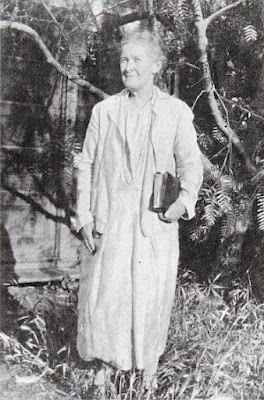January Pentecostal Anniversaries: 1 Agnes Ozman
January 1st, 1901 is a famous date in Pentecostal history. That night, at about 11 o'clock, Agnes Ozman became 'the first one to speak in tongues.' Now, obviously she wasn't the first person ever to speak in tongues. But she has gone down in history as the first recorded person to speak in tongues in the Pentecostal revival at the beginning of the 20th century.
Agnes was 30 years old and attending a Bible School in Kansas in America. Her teacher, Charles Parham, had given his class the assignment of trying to work out what it might mean to 'receive the Holy Ghost' and what the evidence of that might be. The class came to the conclusion that speaking in tongues would be the sign of the Spirit falling on someone.
Now, this Bible School wasn't only a place of study for Agnes, but a place of prayer, meditation, and communion with Christ. She describes it like this:
'We studied the word and had much prayer, not only in the school and in our rooms, but also in the Prayer Tower, where a constant vigil of prayer was kept up day and night. At this school I had many feasts with the Master, while I sought to make a full surrender to God. Much time was given to meditating upon His Word and in praying for the whole world.'
So, on New Year's Day, Agnes asked for the laying on of hands and prayer that she would receive the baptism of the Holy Spirit and speak in tongues.
While she was being prayed for, Agnes herself started praying Hebrews 13:20-21: 'Now may the God of peace who brought up our Lord Jesus from the dead, that great Shepherd of the sheep, through the blood of the everlasting covenant, make you complete in every good work to do His will, working in you what is well pleasing in His sight, through Jesus Christ, to whom be glory forever and ever. Amen.'
Here's what Agnes herself had to say about what happened:
'It was common for me to pray the verses while praying, and it was as if hands were laid upon my head that the Holy Spirit fell upon me and I began to speak in tongues, glorifying God. I talked several languages, and it was clearly manifest when a new dialect was spoken. I had the added joy and glory my heart longed for, and a depth of the presence of the Lord within that I had never known before. It was as if rivers of living water were proceeding from my innermost being.'
'gave us blessed times of refreshing[and] while three of us girls were in prayer, I spoke three words in another tongue. While I did not understand this manifestation then as I do now, yet it was a very precious and sacred experience, and was treasured up in our hearts. Not feeling satisfied with the above experience and having a great burden within, which I knew God could relieve, I decided, January I, I901, to obey the Word and have hands laid upon me and prayer offered that I might receive the baptism in the Spirit.'
'I did as I see so many others are doing in these days, rested and reveled in tongues and other demonstrations instead of resting alone in God.'
'A continual feast is in my soul as I feed on the Word and pour out my soul in prayer, both in the known and in the unknown tongue for the lost. As I speak in tongues, my soul is blessed and lifted up as in I Cor. 14:4, and I wish that all might so speak ... I am looking for the blessed hope and appearing of the glory of the great God and our Saviour Jesus Christ.'
